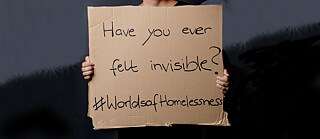“Worlds of Homelessness“
The right to housing is a human right

The Goethe Institute in Los Angeles organized a four-day conference last week, called “Worlds of Homelessness”, bringing local and international scholars, advocates, artists, architects and current or formerly unhoused people together for conversations held in downtown Los Angeles.
By Catherine G. Wagley
The event opened at the Skid Row History Museum and Archive, a space run by the performance art collective the Los Angeles Poverty Department, aka the LAPD. Artist John Malpede, who founded the LAPD in the mid-1980s, collaborates to create performances with residents of Skid Row, where a concentration of the city’s unhoused people live. The collective opened the museum and archive in 2015. It served as an ideal venue for the conference’s opening—and later, its closing—as it assumes that Skid Row residents have the knowledge and expertise to document and preserve their own lived experience.

How do we talk about homelessness?
The opening panel on October 22, titled “Framing the Issue,” questioned the language we use to discuss homelessness, including whether “homeless” is even the best term, and outlined systemic factors contributing to worldwide housing precarity. Ananya Roy, of the UCLA Institute on Inequality and Democracy, spoke about the criminalization of poverty, while Barbara Schönig, director of the Institute for European Urban Studies at Bauhaus-Universität Weimar, discussed the Expropriate Deutsche Wohnen movement in Berlin, a public revolt against private corporate landlords. Crushow Herring, an artist, muralist and entrepreneur who lives on Skid Row, framed living unhoused as a rejection of the very system that racially discriminates and criminalizes poverty. Michele Lancione, an urban ethnographer and activist based at University of Sheffield, argued that our collective narratives – including the limiting ways in which we often discuss homelessness – must change if we want a more inclusive future. After the panel ended, the L.A. Playmakers, musicians who belong to the Skid Row community, played until nearly midnight.
When does life experience become expertise?
On October 23, the conference met at Navel on the southwest edge of downtown for film screenings and a discussion on how art can engage with homelessness. John Malpede, artist Henriette Bouwers, and LAPD collaborator Walter Fears spoke about how the LAPD uses performance to engage conversations around the local and national policies that affect the lives of Skid Row residents. Actor and scholar Licko Turle described how street theater and social movements coalesce in communities of unhoused people in Salvador in Brazil. Fabian Debora, an L.A. artist who currently serves as director Somos LA Arte, the Homeboy Art Academy, described his own journey with addiction and art, and asked when life experience would begin to be seen as true expertise. The question brough warm applause.

A panel at Sci-Arc on October 24 included architects Darin Johnstone from Los Angeles; Alexander Hagner from Vienna; Thorsten Deckler and Tebogo Ramatlo from Johannesburg, South Africa; and Ana Elvira Vélez from Columbia. The panelists presented projects they had completed, and also discussed different ways of thinking about affordable housing. The only event that did not include a current or formerly unhoused person or someone working daily with unhoused communities, this panel ended in heated debate over the language we use to discuss homelessness and the way we talk about money in a world, and a city, with steep wealth disparities.
What needs to change to ensure the right to housing?
“Worlds of Homelessness” ended on October 25, once again at the Skid Row History Museum and Archive. The final panel included two scholars who focused on our lack of adequate, sharable data on unhoused populations worldwide: Jutta Allmendinger, President of the Berlin Social Science Center (WZB), and Hilary Silver, of George Washington University. Two others, Cristina Cielo of the Latin American Faculty for Social Sciences in Quito, Ecuador and Charles Porter of the United Coalition East Prevention Project in L.A., discussed the possibilities for self-organizing and collective empowerment of marginalized communities. The discussion that followed was wide and urgent, once again touching on how both our mentalities and systems of governance and capital must change if we are to ensure a right to housing.

The annual festival of the LA Poverty Department for all Skid Row Artists marked the end of the four-day event. This festival is a cultural folk festival of the area, in which the guests of “Worlds of Homelessness” took part.